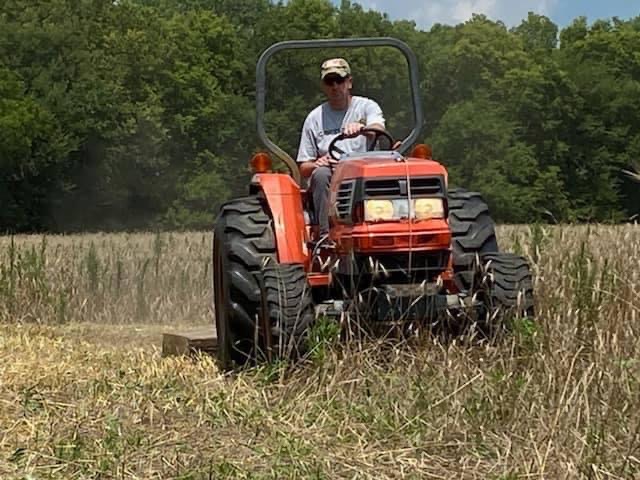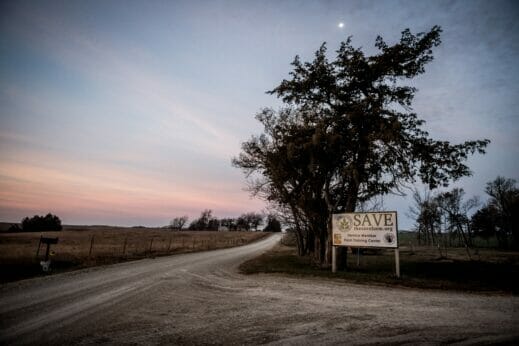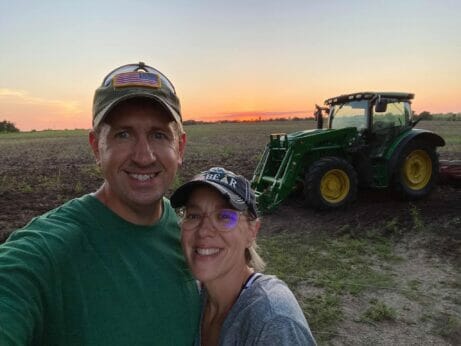This Kansas Farm Gives Veterans A New Path To Civilian Life
SAVE Farm has existed as a non-profit since 2016 to help former soldiers navigate life after service.
This Kansas Farm Gives Veterans A New Path To Civilian Life
SAVE Farm has existed as a non-profit since 2016 to help former soldiers navigate life after service.

Joe Graham is working towards a career in farming after leaving the military, thanks to the program at SAVE Farm.
Joe Graham gave nine years of his life to the war in Afghanistan. Once he got home, he was faced with an overwhelming task: finding a new purpose and new community while battling symptoms of PTSD.
“As a soldier, you serve, and you often see a lot of bad things,” he says. “Coming back into civilian life isn’t easy. I struggled for many years.”
It was on a patch of 308 acres outside of Manhattan, Kansas where life turned around for Graham. That’s where he found SAVE Farm. SAVE, which stands for Servicemember Agricultural Vocation Education, has existed as a non-profit since 2016 to provide veterans with training in sustainable and regenerative farming, paired with support services in mental and physical health.

SAVE’s program, which is five months long, aims to support veterans in their transition to civilian life and prepare them for a career path in agriculture, if they so choose.
“I think this is appealing to a lot of veterans,” says Graham. “It’s peaceful because it’s just you and the animals and the land. You get your hands dirty, but you put in the work to make sure the land can sustain itself.”
Graham, who enrolled in the program with his wife Jennifer in 2021, is working to build a farming business. Since the farm’s inception, more than 50 veterans have graduated from its program. Roughly 75 per cent of its graduates have chosen to pursue a profession in farming.
At a time when more than a third of U.S. farm and ranch operators are over 65 and the rate of suicide for veterans is 1.5 higher than that of the general population, SAVE Farm founders say the non-profit offers multiple wins.
SAVE is the brainchild of retired colonel Gary LaGrange and his daughter Shari, who saw results from providing soldiers with beekeeping training and therapy at nearby Fort Riley army installation in north central Kansas. Tod Bunting, SAVE’s CEO and co-founding member, says he’s seen the positive transformation that happens at the farm.
Having also served in the military, Bunting believes there is a great need for SAVE’s model to be replicated across the country. “I believe that our veterans are in crisis, due to the challenges that come with service,” he says. “This is important work, especially for those with the deepest wounds, the ones that may fall through the cracks, who need a tighter safety net and who need to know people care for them.”
Three part-time farm staff and two AmeriCorps staff help manage SAVE’s operations, where they have goats, sheep, ducks, cattle and rabbits. They grow corn, sorghum, soybeans and wheat, as well as barley, triticale and alfalfa for cover crops. An orchard currently grows hazelnuts and blackberries. There’s also an apiary for beekeeping and a high tunnel, which is a teaching station for horticulture.
But Bunting says it’s the partnerships between Kansas State University, the USDA’s NCRS, the Kansas Association of Conservation Districts, The Nature Conservancy and other farmers that have allowed the non-profit to build a network of people to design the curriculum and provide specialized educational sessions. Those who enroll in SAVE’s comparative agricultural programming are taught all parts of farming, animal science and plant science with sustainability top of mind. Regenerative practices such as no-till, cover crops, diversification, grazing for wildlife and managing for pollinators are all integrated into the farm’s programs.
And, in keeping with a vision to grow the program and graduate 100 veterans a year, the organization hopes its programs will become an accredited university under the G.I. Bill, meaning the government would cover the cost of enrollment.
Heidi Mehl, The Nature Conservancy’s director of Kansas Water and Agriculture, would also like to see the non-profit get that accreditation. Mehl, who has worked with SAVE to design its curriculum and incorporate regenerative practices, says the farm’s work can make a substantial environmental impact.
“We’re hoping for ripples in a pond,” says Mehl. What she means is that, ideally, a graduate incorporates those practices on their farm, and then their neighbor sees that they work and also adopts them. Studies have shown that farmers and ranchers are more likely to try something different on their land if they see their neighbor do it.
Those regenerative practices, such as rotational grazing, cover crops and promotion of soil health, are key to building resiliency in the land, says Mehl, highlighting a third benefit to the farm’s model.
“I know how important farming is to our economy and to our local communities in Kansas,” she adds. “These regenerative practices are just another tool we can use to ensure our communities are strong.”

That approach to environmental stewardship and conservation are something that Joe and Jen Graham try to honor in their own farm work. Currently, in an “incubation” period on SAVE Farm, the pair is raising a flock of 40 chickens—or what they hope is a humble beginning of a thriving farm business. By spring, they’re aiming to have tripled their flock, selling their eggs at local farmers markets. Later, they plan to incorporate some livestock they can raise.
Beyond being the springboard for the couple’s business, the Grahams say the SAVE Farm and its community are the reason the future looks bright.
“This has given my life a sense of direction, an opportunity to heal and find my new life in this world,” Graham says. “It’s a lot of hard work, but it’s a good life.”
Follow us
This work is licensed under a Creative Commons Attribution-NoDerivatives 4.0 International License.
Want to republish a Modern Farmer story?
We are happy for Modern Farmer stories to be shared, and encourage you to republish our articles for your audience. When doing so, we ask that you follow these guidelines:
Please credit us and our writers
For the author byline, please use “Author Name, Modern Farmer.” At the top of our stories, if on the web, please include this text and link: “This story was originally published by Modern Farmer.”
Please make sure to include a link back to either our home page or the article URL.
At the bottom of the story, please include the following text:
“Modern Farmer is a nonprofit initiative dedicated to raising awareness and catalyzing action at the intersection of food, agriculture, and society. Read more at <link>Modern Farmer</link>.”
Use our widget
We’d like to be able to track our stories, so we ask that if you republish our content, you do so using our widget (located on the left hand side of the article). The HTML code has a built-in tracker that tells us the data and domain where the story was published, as well as view counts.
Check the image requirements
It’s your responsibility to confirm you're licensed to republish images in our articles. Some images, such as those from commercial providers, don't allow their images to be republished without permission or payment. Copyright terms are generally listed in the image caption and attribution. You are welcome to omit our images or substitute with your own. Charts and interactive graphics follow the same rules.
Don’t change too much. Or, ask us first.
Articles must be republished in their entirety. It’s okay to change references to time (“today” to “yesterday”) or location (“Iowa City, IA” to “here”). But please keep everything else the same.
If you feel strongly that a more material edit needs to be made, get in touch with us at [email protected]. We’re happy to discuss it with the original author, but we must have prior approval for changes before publication.
Special cases
Extracts. You may run the first few lines or paragraphs of the article and then say: “Read the full article at Modern Farmer” with a link back to the original article.
Quotes. You may quote authors provided you include a link back to the article URL.
Translations. These require writer approval. To inquire about translation of a Modern Farmer article, contact us at [email protected]
Signed consent / copyright release forms. These are not required, provided you are following these guidelines.
Print. Articles can be republished in print under these same rules, with the exception that you do not need to include the links.
Tag us
When sharing the story on social media, please tag us using the following: - Twitter (@ModFarm) - Facebook (@ModernFarmerMedia) - Instagram (@modfarm)
Use our content respectfully
Modern Farmer is a nonprofit and as such we share our content for free and in good faith in order to reach new audiences. Respectfully,
No selling ads against our stories. It’s okay to put our stories on pages with ads.
Don’t republish our material wholesale, or automatically; you need to select stories to be republished individually.
You have no rights to sell, license, syndicate, or otherwise represent yourself as the authorized owner of our material to any third parties. This means that you cannot actively publish or submit our work for syndication to third party platforms or apps like Apple News or Google News. We understand that publishers cannot fully control when certain third parties automatically summarize or crawl content from publishers’ own sites.
Keep in touch
We want to hear from you if you love Modern Farmer content, have a collaboration idea, or anything else to share. As a nonprofit outlet, we work in service of our community and are always open to comments, feedback, and ideas. Contact us at [email protected].by Lindsay Campbell, Modern Farmer
November 12, 2022
Modern Farmer Weekly
Solutions Hub
Innovations, ideas and inspiration. Actionable solutions for a resilient food system.
ExploreExplore other topics
Share With Us
We want to hear from Modern Farmer readers who have thoughtful commentary, actionable solutions, or helpful ideas to share.
SubmitNecessary cookies are absolutely essential for the website to function properly. This category only includes cookies that ensures basic functionalities and security features of the website. These cookies do not store any personal information.
Any cookies that may not be particularly necessary for the website to function and are used specifically to collect user personal data via analytics, ads, other embedded contents are termed as non-necessary cookies.
We need many more farms like this one.
Fantastic.
Veterans need lot of support from the Government to settle in life. Please elucidate some of the supports available now which would stimulate others.
Few success stories in different kinds of farming may please be published. .